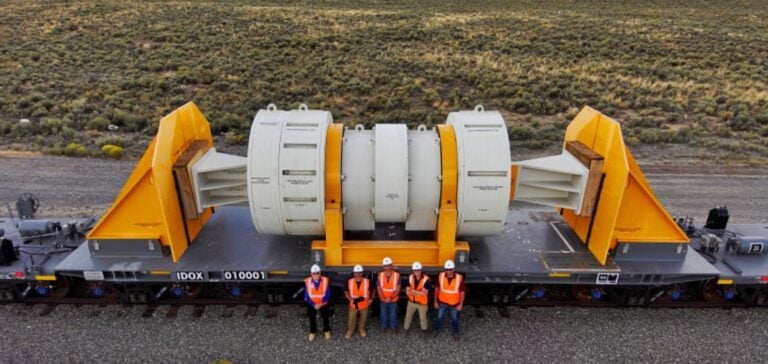NANO Nuclear Energy signs an agreement with GNS Gesellschaft für Nuklear-Service mbH (GNS) to develop an optimized nuclear fuel transport system, based on NANO Nuclear’s patented design.
This partnership aims to develop a solution suitable for various types of advanced nuclear fuel, such as oxidized uranium, TRISO particles, uranium-zirconium hydride (U-ZrHx), uranium mononitride (UN) and molten salt fuel.
This initiative is crucial for the nuclear industry, which faces logistical and safety challenges in transporting these sensitive materials.
The project includes an in-depth study supervised by GNS to assess the specific needs of each fuel type, from technical design to risk and cost assessments.
GNS is contributing its expertise in the processing and safe packaging of radioactive materials.
This collaboration could play a key role in the modernization of nuclear transport infrastructures, guaranteeing safe and efficient operations.
A logistical challenge for the nuclear industry
The nuclear industry is faced with increasingly complex fuel transport challenges.
The diversity of fuel types, each with distinct physical and chemical properties, imposes specific requirements for their safe transportation.
The agreement with GNS represents a response to this complexity, offering an integrated transport solution that takes into account the particularities of each fuel type.
The collaboration between NANO Nuclear and GNS is part of a wider drive to optimize nuclear supply chains.
By integrating design, licensing and manufacturing processes under a single project, the two companies aim to minimize risk and maximize transport efficiency.
The aim is to establish a new standard for the safe transport of advanced fuels, meeting both regulatory requirements and operational needs.
Impact on safety and regulations
The issue of safety remains at the heart of this project.
Nuclear fuel transport systems must meet rigorous safety standards, and the partnership between NANO Nuclear and GNS includes supervision under the NRC (Nuclear Regulatory Commission) Quality program to ensure compliance with international standards.
This strict regulatory framework is essential to prevent any potential incidents when transporting highly radioactive materials.
GNS plans to specifically examine four fuel types: TRISO pebbles, uranium-zirconium hydride (U-ZrHx), uranium mononitride (UN), and molten salt fuel.
Each type of fuel presents unique challenges, requiring tailor-made solutions to ensure their safe transport.
This in-depth analysis enables us to develop innovative approaches while complying with regulatory constraints.
A step towards self-sufficiency in nuclear fuel transport
By developing in-house solutions for fuel transportation, NANO Nuclear aims to reduce its dependence on external suppliers and increase its operational autonomy.
This verticalization strategy could offer a significant competitive advantage, particularly in a sector where safety, speed and efficiency of transport are critical success factors.
James Walker, CEO of NANO Nuclear, emphasizes that this initiative could transform nuclear logistics, enabling the company to better control the transportation of fuel for its micro-reactors under development.
By creating a robust and adaptable solution, the company is positioning itself to meet the growing needs for fuel transport in remote or difficult-to-access areas, while ensuring that the most stringent safety standards are met.
Outlook for the nuclear industry
The agreement between NANO Nuclear and GNS is indicative of a wider trend in the nuclear industry: the need to modernize and secure the fuel supply chain.
As advanced reactors, such as micro and small modular reactors (SMRs), become a commercial reality, innovative transportation solutions will be essential to support their deployment.
Initiatives to improve fuel transport logistics, such as this one, are crucial to the sustainability and acceptability of nuclear power in the future energy landscape.





















